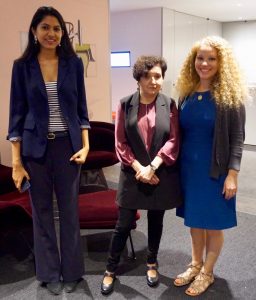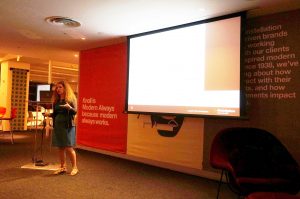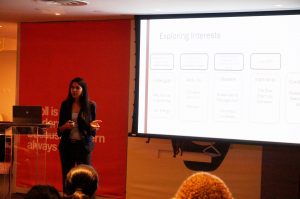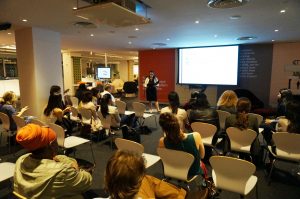November 13, 2016
by Keith Wong
October’s GreenHomeNYC Sustainable Career Tracks explored careers that focus on reducing the public health threats found in materials, goods and services. The speakers came from a variety of fields that are responsible for different phases of sustainable projects and products, but all share a common theme: they look to product and business life cycles to attain sustainability standards and specifications.

Photo credit: Emily Taubenblatt
The presenters were Susan Kaplan, Director of Specifications and Sustainability at HLW, whose responsibilities involve her in the design, completion, and certification of sustainable architecture projects; Rachel Berman, who, as Sustainability Program Manager of MechoSystems, focuses on optimizing their products’ material content, and works with clients to ensure that they meet their goals for daylight harvesting; and Prerna Chatterjee, Sustainability Specialist at BASF, whose efforts engage integral parts of the supply chain in meeting sustainability goals.
The career trajectories of the speakers were as varied as their job responsibilities, and each found herself in her current position after a series of twists and turns on the road to becoming a passionate sustainability expert.
Susan Kaplan: From Scenery to Specifications
Susan started out as a theater major. Her interest in scenery and props led her to art school eventually to architecture. As a young architect she worked on hospital projects, where the focus was on human health and the health impact of the materials. She moved into the more technical aspects of architecture and learned how to do the “written part of architecture.” Susan found herself interacting more and more with people whose passions were in sustainability and soon realized that sustainability defined her primary circle of peers. It was then that she decided to focus her career on sustainability.
In her work as a specifier, Susan writes the project manuals that contain product information and specifications, as well as the quality standards for architecture projects. Specifiers need to have a deep knowledge of product characteristics, quality standards, and code requirements. They also need to be able to advise designers and contractors in choosing products that are not only sustainable but also perform the best for the project’s success and timeliness.
An important career lesson that attendees learned from Susan’s presentation is to pay close attention to your interests and be comfortable shifting gears as you gradually discover your true vocation.
Rachel Berman: From Study Abroad to Sustainability
Rachel has a Bachelor’s of Science in Organizational Leadership and Spanish Studies from the University of Delaware and a Master of Science in Environmental Policy and Sustainability Management from The New School. She got the sustainability bug as an undergrad primarily during her experiences studying abroad. She credits her time in Peru, where she studied environmental sustainability in marketing, and her trip to Eastern Africa, where she studied women’s rights, as the driving factors in her decision to pursue a career in sustainability.

Photo credit: Emily Taubenblatt
Rachel’s work as a Marketing Coordinator at MechoSystems exposed her to sustainability in the built environment, and led her to graduate school, where she leveraged many internships to broaden and deepen her knowledge of sustainability. After graduating, she became a Sustainability Coordinator with the sustainability consulting firm YR&G, and then landed her current role as the Sustainability Program Manager at MechoSystems! a window shade manufacturer, that makes manual, motorized and automated shade systems. In her current position Rachel is responsible for ensuring the use of sustainable materials in the company’s products, as well as overseeing the design of shade systems for enhanced daylighting capability and capacity to be repurposed or reused at the end of their useful life.
When it comes to job hunting Rachel offered the following advice: “As you get into the job you see yourself in, get involved with as many professional organizations as possible related to your industry. That’s where you’ll meet many people outside your company.” She added that the “most important part of finding jobs is your network, going to events like career tracks, events in your current company, and go grab coffee with people. These are the people who will introduce you to your next position and continue to stay active in your networks.”
Prerna Chatterjee: From Renewables to Business Strategy
Prerna has a Bachelors degree in Mechanical and Energy Engineering from Vellore Institute of Technology and a Master of Science in Sustainability Management from Columbia University. Her journey took her literally around the world as she fine-tuned her sustainability career, starting in India and ending up (for now) in New York. At first focused on renewable energy, she soon discovered carbon footprint analysis was a more compelling pursuit for her. This shift took her to Germany and work with Oerlikon, where she soon realized there was even more to sustainability. She decided that a Masters degree at Columbia would give her both a wider perspective and a deeper knowledge of the field.

Photo credit: Emily Taubenblatt
Going into her final semester Prerna took an internship at DOW Chemical company, where she performed the Life Cycle Assessments to support an Environmental Production Declaration (EPD) for STYROFOAM production in North America. She is now a Sustainability Specialist with BASF, on the Strategy and Business Implementation team. She works with clients to map out their entire value chains and helps to analyze ways in which BASF products can be made more sustainably and in line with the company’s business model and strategy.
Prerna’s advice to career searchers is not to rely only online job postings. As she was graduating from grad school she applied for well over 200 jobs online without much luck. Then it hit her–she was in one of the best places to network, New York City–and that became her new strategy. Her advice for networking: “If you go for informational interviews, it’s OK to meet with junior level people first. Just make sure you come away with a contact that would be in a hiring position.” Do your homework, research on LinkedIn, find out who the hiring manager is, and ask to be connected.

Photo credit: Emily Taubenblatt
As sustainable practices in the built environment continue to expand, there will be an increased demand for professionals in the development of sustainable products and disclosure of the sustainable properties of those products. There is a greater need for material transparency and, as the speakers at the event have expressed, companies are expanding their efforts to meet the needs of their customers and clients.
The speakers brought an array of backgrounds and experiences to their careers, but they have two important things in common. They each followed their interests and passions in order to drive their education and career choices. Then, to land their current roles, they couldn’t stress more the importance of networking and relationship building.




